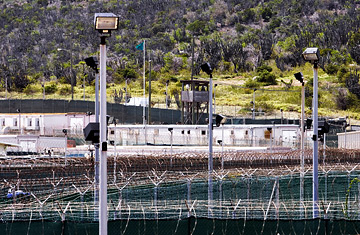
The minimum security section of Camp Delta at the U.S. Naval Station in Guantanamo Bay, Cuba, April 24, 2007.
The cancellation of a discussion of the U.S. detention facility at Guantanamo from the agenda of a scheduled White House meeting on Friday appears to be another example of the growing conflict inside the Bush Administration over whether to close the controversial facility. Neo-conservative hard-liners, clustered around Vice President Dick Cheney, would like to keep the camp open, while more pragmatic officials, such as Secretary of Defense Robert Gates and Secretary of State Condeleezza Rice, have indicated they would like to see the prison camp shuttered.
"It's no longer on the schedule for tomorrow," White House National Security Council spokesman Gordon Johndroe said late Thursday. "Senior officials have met on the issue in the past, and I expect they will meet on the issue in the future."
Johndroe's statement appeared to confirm that a White House meeting on Guantanamo had been considered for Friday but was subsequently put off. The cancellation came after the AP reported on Thursday that the Administration was nearing a decision to shut the facility.
"No decisions on the future of Guantanamo Bay are imminent," said White House spokeswoman Dana Perino. "The President has long expressed a desire to close the Guantanamo Bay detention facility and to do so in a responsible way."
Legal and human rights experts, among other critics, have long contended that Guantanamo—where some 380 suspected al-Qaeda and Taliban captives are being held without trial, in many cases since 2002—represents a shameful blot on America's moral and legal principles. Close U.S. allies, including Britain, Germany and others, have also called for the camp's immediate closure.
Though President Bush has expressed his intention to eventually close the facility, he has vigorously defended the integrity of legal proceedings there. Supporters of the Gitmo status quo—who include officials at the Department of Homeland Security and some in the Justice Department—worry that a transfer of terrorist suspects to the U.S. could give them legal rights—such as the right to appear in court with a lawyer—that would set off a new round of judicial proceedings that could go against the Administration. Those who argue that prisoners should remain at Gitmo also fear the consequences of allowing high-value detainees like 9/11 mastermind Khalid Sheik Mohammed onto American soil.
Beyond that, the U.S. has had trouble finding countries willing to accept some 75 prisoners that it wants to release, and is grappling with how it will try roughly 80 others in if they are brought into the U.S.
White House spokesperson Perino has said that a variety of steps would be necessary prior to Guantanamo's closure, notably the establishment of military commissions and the repatriation to their home countries of detainees who have been cleared for release.
Vice President Dick Cheney has reportedly voiced strong reservations about closing Guantanamo, arguing that detainees should not be brought into the U.S. legal system where they might enjoy rights they do not deserve.
But Secretary of Defense Robert Gates—associated with pragmatic decision makers inside the Administration—has signaled he would like to close Guantanamo. Since replacing Donald Rumsfeld, an architect of the faltering Iraq war, Gates has begun to remake the U.S. military command, replacing key figures associated with failures in Iraq, notably Peter Pace, Rumsfeld's choice to be chairman of the Joint Chiefs of Staff, as well as the Army leader of Central Command, which directs the Iraq theater and its adjacencies.
The Bush Administration has suffered embarrassing legal setbacks over the imprisonment of alleged terrorists at Guantanamo. Last year, the Supreme Court invalidated Bush's system of military trials for Guantanamo prisoners. Late in 2006 the Republican-led Congress enacted a law that created a new system of military tribunals in an attempt to address legal flaws identified by the court.
President Bush has long championed Guantanamo as an essential tool in America's "war on terrorism," while admitting the facility should be closed at some point. Now, it appears that Bush's growing political weakness and pressure from pragmatic elements within his own Administration may be forcing him toward that eventuality sooner rather than later, even as hard-liners like Cheney continue to resist.
